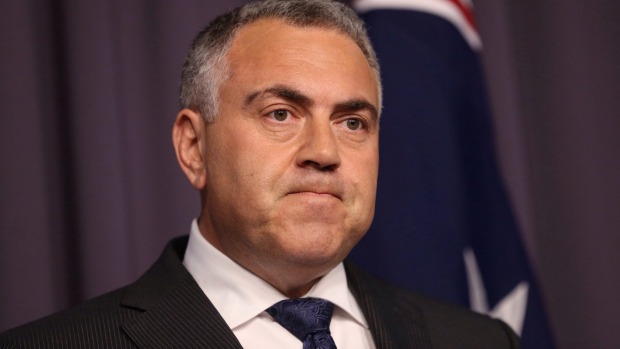
If Hockey continues to insist the government is committed to the $7 levy, and the $20 billion research fund, then his time as an effective member of the government is over. Photo: Andrew Meares
The collective carnivorous hunger of the parliamentary press gallery was whetted at question time on Wednesday. Sitting at the dispatch box, the position usually occupied by the Prime Minister, was Foreign Minister Julie Bishop. Sitting opposite, in the position usually occupied by the Leader of the Opposition, was his deputy, Tanya Plibersek. Oh how the gallery would like to see that scenario play out before the next election.
The amount of blood involved would be a feeding frenzy of speculation and poll-driven agitation. It could happen. Tony Abbott is flat-lining with the public and Bill Shorten has yet to navigate all the skeletons in his union cupboard.
The $7 levy, or tax, or fee, or co-payment is zombie politics. It has zero chance of passing the Senate.
Adding to the mood was the demeanour of the Treasurer, Joseph Benedict Hockey. For the first year of the Abbott government, he was the most ebullient of ministers. Not since Peter Costello has a treasurer dominated parliamentary debates. But Hockey is subdued.
Across the chamber, cat calls poured in, with calls of “Poor Joe”. One Labor backbencher, Ed Husic, the man who forgot to mention he was a union official in his election pamphlets, was so cocky and noisy that he was thrown out of the chamber.
A thunderstorm was lashing Canberra. Rain was pelting the windows. Hockey was pensive, as well he might be. Some of his own colleagues had put an ice-pick in his political side.
It must have dawned on the Treasurer that his willingness to make tough decisions, and confront the drift into debt and deficit that Australia must avoid, is getting little support from the public and is now also shrinking from his own party room.
The party room has come to hate the $7 Hockey tax on visits to doctors, and this hatred pales in comparison with the cold loathing for Hockey’s proposal to use the tax to pour $20 billion into a giant medical research fund.
On Monday, the Coalition’s economic committee refused a request from the Minister for Finance, Mathias Cormann, to approve a bill that would enable this research fund to be set up. This was an open rebuke. It was also a sign some sanity is beginning to return to the Liberals on this issue.
If Hockey continues to insist the government is committed to the $7 levy, and the $20 billion research fund, then his time as an effective member of the government is over. He becomes a liability. It’s a real red line.
The $7 levy, or tax, or fee, or co-payment is zombie politics. It has zero chance of passing the Senate. It has zero chance of being rehabilitated with the electorate. The $20 billion research fund has zero chance of being funded. And it has zero chance of ever winning approval from the community.
The whole thing was a political and conceptual disaster from the moment it came out of the Treasurer’s mouth on budget night on May 13, 2014.
The inevitable death of this tax and its $20 billion spending white elephant will mark the point at which the Abbott government begins its retreat from Moscow, the long march back to credibility and authenticity with the public. Hopefully, the retreat will not be as disastrous for Abbott as it was for Napoleon. The Labor Cossacks will do their best to inflict damage.
If Hockey continues to wrap his reputation around this measure, then he is heading for an embarrassment that will damage not just him but his Prime Minister.
Far better for the offices of the Prime Minister and the Treasurer to draft a gracious exit strategy that acknowledges the Senate has blocked the measure, the people have spoken, and the government has abandoned this policy and will seek others ways to repair the budget.
A golden opportunity for such an admission will present itself in two weeks, when the Treasurer presents the mid-year budget statement. As Hockey’s demeanor has telegraphed, this will be a sober reassessment of a deteriorating federal debt and deficit position. Defeats in the Senate, plus falling commodity prices, have hit hard.
This is the reset button, the new reality, and the new narrative. It presents not merely a cost, but an opportunity.
Twitter: @Paul_Sheehan_
